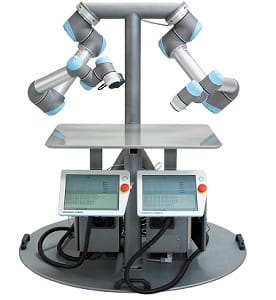Robotics make self-service business easier than ever

 The Singularity is coming. Or is it the Terminator? Or maybe, at long last, we’re on our way to Jetsons-style, automation, where Rosie the Robot handles all the drudgery, freeing up humans to enjoy the good and easy life.
The Singularity is coming. Or is it the Terminator? Or maybe, at long last, we’re on our way to Jetsons-style, automation, where Rosie the Robot handles all the drudgery, freeing up humans to enjoy the good and easy life.
It’s hard lately not to notice the proliferation of “rise of the robots”-type news articles and commentaries hinting at one of these potential futures. Nobel-winning economist Paul Krugman has tackled the subject. The New York Times has described how robots can now pack lettuce for shipping faster than two to five humans. Energy writer Gregor Macdonald warns against heeding the robot’s “siren song.” Time magazine dedicates a cover to the increasingly busy robot of the skies, the drone. And the Atlantic leaves hanging the question, “What happens to millions of low-skilled workers when machines can do their jobs faster, quicker and more cheaply?“
Meanwhile, smart-city visionaries typically picture plenty of self-service technologies making life better, easier and more efficient for urban citizens of the near-future. Streetline, for example, is helping commuters in cities like Jacksonville, Florida, find available car parking using their cellphones. Datalogic’s LaneHawk makes sure shoppers don’t walk out without paying for everything they buy. And public libraries are experimenting with all sorts of self-service technologies to draw in patrons and possibly add new sources of revenue.
Who’s who in robotics and self-service technologies
Following are just a few of the many companies offering advanced, IT-enabled self-service and robotic technologies for businesses, governments, educational institutions and other organizations:
Kiva Systems – This is the system that Amazon finds so promising for warehouse order fulfillment that it actually bought the company. Kiva Systems’ robotic drive units respond to each separate order and bring mobile inventory pods to human workers who then help fulfill each order.
Nuance Communications – The Massachusetts-headquartered Nuance Communications provides “voice and language solutions” that include the Nina Virtual Assistant. Designed for mobile customer service, Nina now delivers speech-based virtual assistant and self-service customer service capabilities in 38 languages.
Parabit – Based in New York state, Parabit provides such self-service technologies as visitor management kiosks (with options for web-based pre-registration and access control integration) and wayfinding kiosks for schools.
Parrot – Parrot’s AR.Drone 2.0 is not only affordably priced ($200 to $300) for the average tech-loving consumer, but is being touted as a potential tool for movie-makers, emergency responders, urban planners and mine developers, among others.
Robofusion – What better use for robotic kiosks could there be than … selling four-layer frozen yogurt and five-layer ice cream treats without human employees? It might not be the top-priority technology for tomorrow’s smart cities, but Robofusion’s kiosks — as the South Carolina-based company notes — offers the benefit of being able to “operate 24/7 with no full-time staff. They only need to be serviced when restocked and started in the morning.”
Universal Robots – Based in Denmark, Universal Robots makes lightweight “collaborative” robots that are designed to be deployed quickly and work alongside human employees in automated production processes.
Wincor Nixdorf – The German company focuses on technologies for “consumer-facing operations,” especially for banking and retail operations. Among its products are reverse vending machines for recyclables, self-service postal terminals and self-service fast-food ordering and payment terminals.




